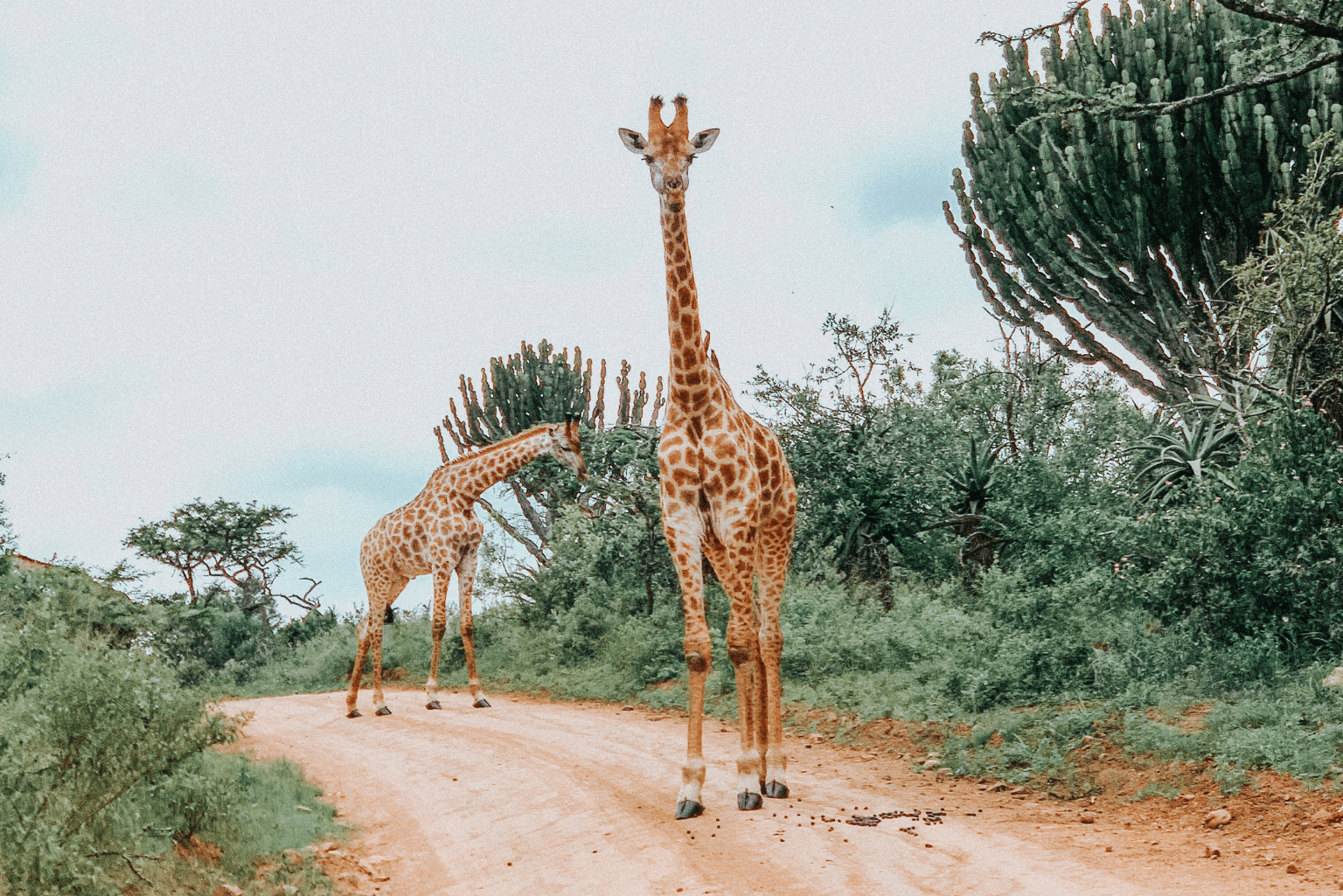It may just be the perfect time to take that African safari vacation — and these eco-luxury destinations are the way to go.
Covid took a toll on travel across the globe. For Africa, it was no different. Ninety-three percent of tour operators reported at least a 75 percent decline in bookings; 90 percent of travel businesses across the continent said they had concerns about their survival, according to Aviation Benefits Without Borders.
The organization says pre-covid, tourism was a $39 billion industry for Africa, with safari travels accounting for nearly a third of it — $12 billion in annual revenues for several countries, including Kenya, Rwanda, South Africa, Tanzania, Uganda, and Zambia. Covid didn’t just take a toll on tourism — it also increased concerns over elephant and rhinoceros poaching for ivory. As other sectors shut down, many turned to illegal poaching as a means of survival. “For rural communities, the safari industry represents an important source of income for thousands of families and local businesses,” ABWB says. “The absence of tourism funds also hinders community development projects that support schools and health clinics.”
But, four years after the pandemic, Africa’s tourism industry is once again coming to life and these eco-luxury safaris help boost local economies, protect critical wildlife, and will give you the experience of a lifetime.
Best eco-luxury safaris
One of the biggest trends in safari tours — pre- and post-covid — is eco-luxury. These tours are reducing their overall impact and encourage guests to do the same. Sustainable tour operators are cropping up all over the continent, bringing a deeper awareness to visitors about the entire regional ecosystems and the impacts of climate change, deforestation, and biodiversity loss.
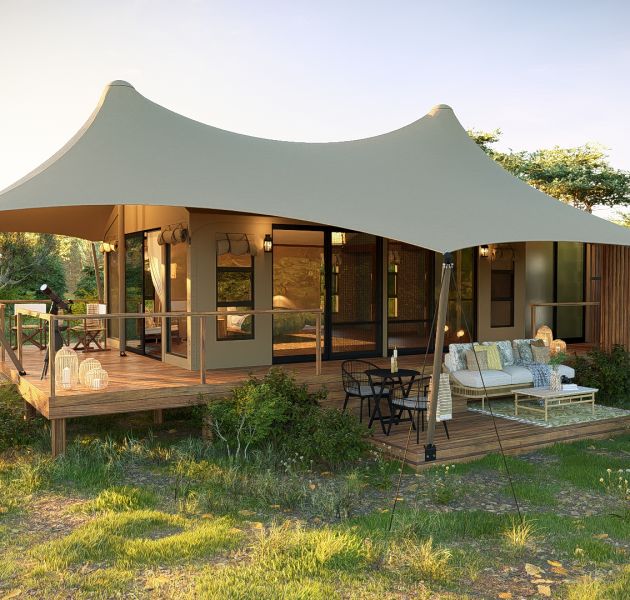
1. Envi Kili
This new development, a partnership between Envi Lodges and American investment entity Global Tourism Investments Inc., alongside its subsidiary Tanzanian company Golf Safari Resorts & Spa, is poised to become a beacon of luxury, sustainability, and immersive natural experiences, featuring a blend of eco-friendly design and high-end amenities.
The luxury tented camp, designed by architectural firm Tenthouse Structures, offers 20 keys and is tailored to integrate luxury with the natural environment. Guests will be treated to a variety of experiences including a restaurant that utilizes locally grown ingredients, a wellness facility with nature-based treatments, a yoga deck, and the brand’s signature barefoot luxury experiences. The camp’s unique selling point is its personal adventure concierge service, catering to guests’ desire for personalized and adventurous experiences. “It is thrilling to partner with Envi Lodges to debut this visionary concept in Tanzania,” said Niru Patel, co-founder of Tanzanian company Golf Safari Resorts & Spa. “We strongly believe that our luxury tented camp in Arusha will be the lodging of choice for discerning safari travelers who wish to experience all the amazing Serengeti has to offer.”
Chris Nader, co-founder of Envi Lodges, highlighted the strategic importance of Arusha as a prime location for the venture. “There is substantial demand for high-quality experiential lodging in Arusha. Our goal is to redefine the city’s traveler experience, positioning Envi Kili as a market leader. We are incredibly proud to join forces with the esteemed Patel family, united by our shared commitment to forging a sustainable future for Tanzania’s hospitality sector, not only improving Arusha for its visitors, but its residents – the visited.” The location offers guests access to Tanzania’s world-renowned safari destinations, including the Serengeti National Park, making it an ideal stopover for travelers. Additionally, the camp is situated in a region known for its rich biodiversity and proximity to both Mount Kilimanjaro and Mount Meru — with breathtaking views and a range of adventure and entertainment options including world-class golf and a polo club.
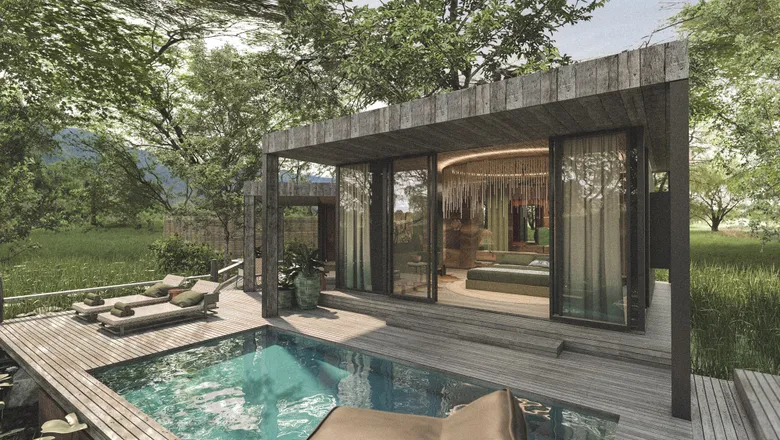
2. Lolebezi
The Lower Zambezi National Park in Zambia is home to Lolebezi, a new luxury safari camp set to open on the park’s east side, created by African Bush Camps. Completely off-grid, the camp is powered by a solar farm in a nearby forest clearing. The resort manages its wastewater to ensure it doesn’t pollute the forest. Food is sourced locally. The safari camp, which can accommodate 16 guests in its suites, emphasizes environmentally sensitive design.
Family suites offer private pools. All suites open to a view of the river. The hotel features a spa and wellness facility, open-air cinema, and river “pods” that allow for retreat and private picnics. Guests have no shortage of activities including game drives and guided walking safaris, riverboating, canoeing, among others.
“Lolebezi is a dream setting for travelers to experience the abundance of Africa and the beauty and power of the Zambezi River,” said Beks Ndlovu, a veteran professional guide who established African Bush Camps in 2006.
“As ABC expands its expertise in Zambia with a second lodge, our newest destination continues to redefine the safari experience with opportunities for adventure, learning, abundant wildlife amidst pristine wilderness and pure comfort designed to sustainably blend with its environment.”
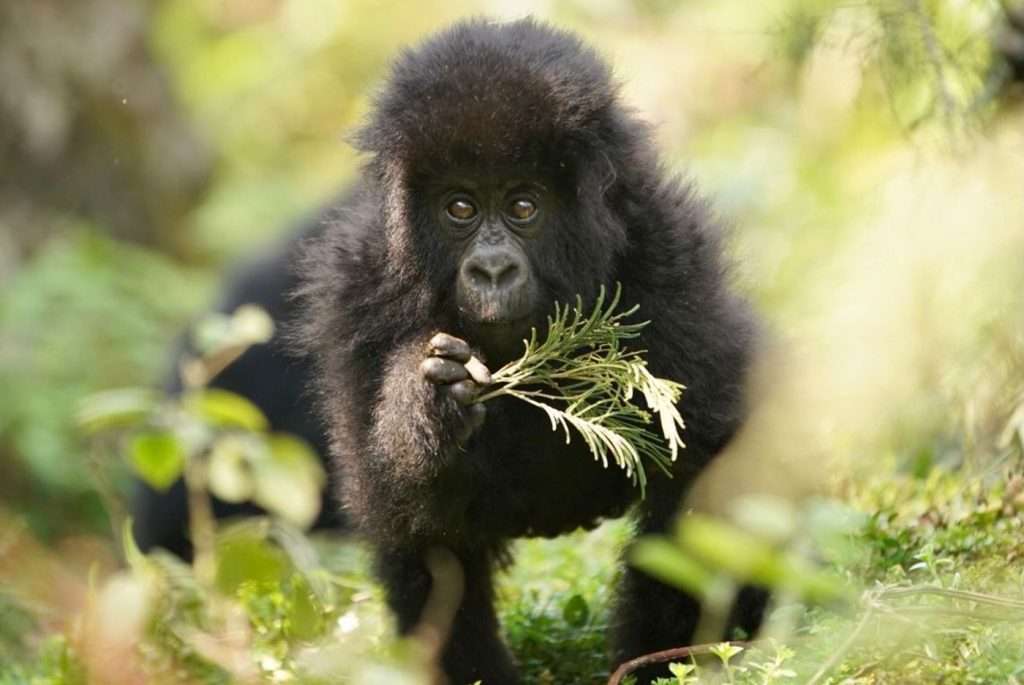
3. Marriott Masai Mara Lodge
Marriott International and Baraka Lodges partnered on the JW Marriott Masai Mara Lodge — Marriott’s first safari accommodations. The property is located in the Mara National Reserve in Kenya, overlooking the banks of the River Talek. “As a brand rooted in mindfulness, we cannot think of a more perfect retreat for the mind, body, and soul than the Masai Mara National Reserve in Kenya,” Bruce Rohor, JW Marriott’s VP and Brand Leader, said in a statement.
“JW Marriott Masai Mara Lodge will offer guests a luxurious backdrop to make once-in-a-lifetime memories as they connect with nature and wildlife as never before. We are thrilled that the JW Marriott brand will be welcoming adventure travelers, including families, to this breathtaking part of the world.”
Conservation will be at the heart of the property, “creating harmony with the natural world and drawing inspiration from the elements: earth, wind, fire, and water,” the hotel chain says, calling it a milestone in Marriott International’s growth in Africa, as the company enters the luxury safari segment. “This landmark project is in response to travelers’ growing desire for experiential offerings that enable them to build a deeper connection with their chosen destination. JW Marriott encourages guests to be mindful and present, which perfectly lends itself to meaningful safari holidays,” said Jerome Briet, Chief Development Officer, Europe, Middle East & Africa, Marriott International.
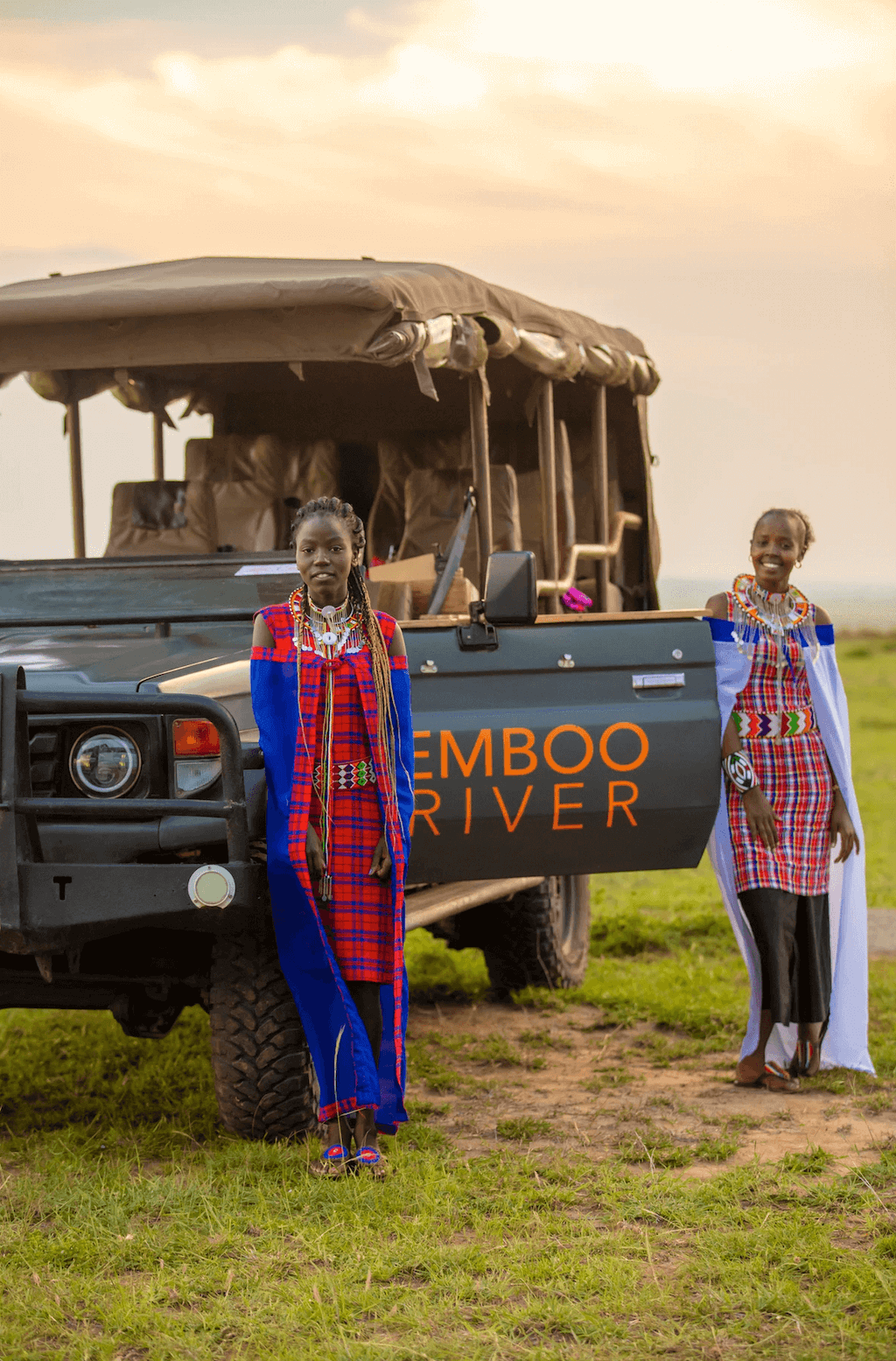
4. Emboo River
In the heart of Kenya’s Masai Mara, Emboo River is bridging sustainability and safari as the first tour operator in East Africa with a fully electric vehicle fleet. The safari facilities are also powered by solar and take other sustainability measures including recycling efforts and vegan meals.
“Emboo” is the Maasai word for a pride. “It is our honour to introduce you to our wonderful community,” the tour operator says on its website. “Let’s do things better,” reads the Emboo River website. “Let’s be leaders in sustainability. Let’s change the status quo in the tourism business, because there’s nothing luxurious or relaxing about a holiday with loud and polluting safaris.”
Emboo River offers “silent safaris” for a meditative experience that’s reinforced with luxury accommodations. Rooms have floor-to-ceiling views over the river. Furnishings are made by local artisans, a move Emboo says supports the local economy.
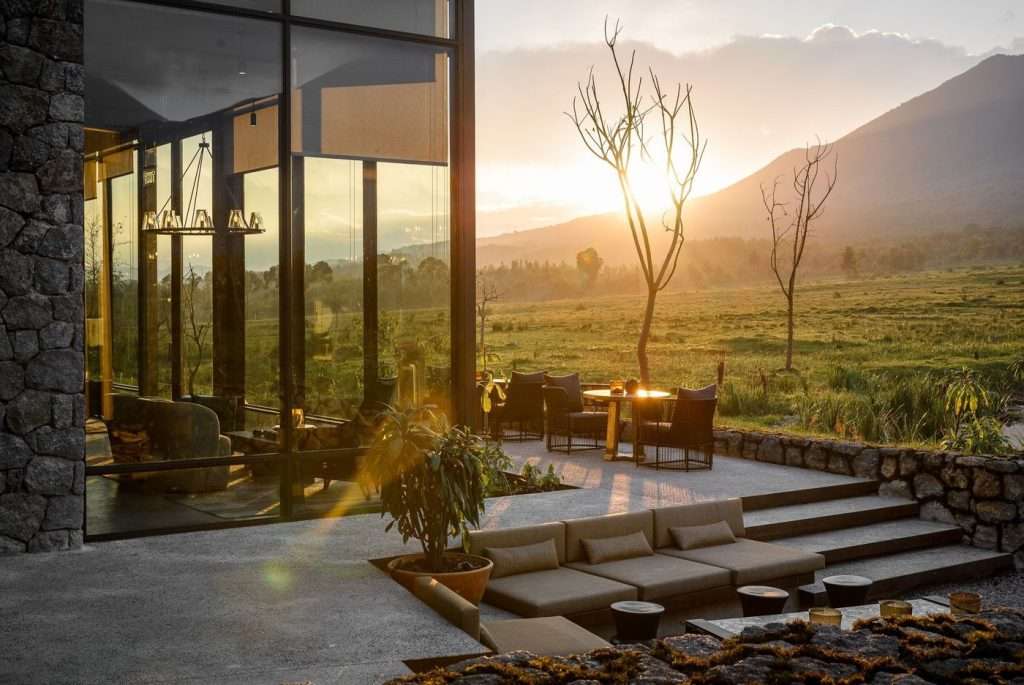
5. Roar Africa
Roar Africa, founded by Deborah Calmeyer, doesn’t just offer luxury safaris, but it also prioritizes carbon offsets, conservation, elevating women, and community empowerment.
“I got sick and tired of what I call the pale male safari industry, so I wanted to change that picture,” Calmeyer says. “Tourism is a natural fit for women; we are caregivers—it’s in our DNA. My vision for Africa has always been, ‘If African women rise, wildlife will thrive.’ That’s been a thread I have hung onto all the way and I weave that into every single trip.,” she says.
“We not only want to break the Western glass ceiling, but the tribal one,” she says. “The only way to shift the perception of working women is by actually demonstrating it. Now you’re seeing lodges promoting women to executive chefs, sommeliers, or general managers, and promoting it on their Instagram.”
Since 2005, Roar has been delivering clients top-notch safaris — including one it dubs, The Greatest Safari on Earth. That 12-day excursion starts at $125,000 per person. Roar’s tours cover 13 countries including Botswana, Kenya, Madagascar, Mauritius, Mozambique, Namibia, Rwanda, Seychelles, South Africa, Tanzania, Uganda, Zambia, and Zimbabwe.
“Selling a destination is very different to selling ones’ home,” Calmeyer told Penta. “The thing about Africa is that it never disappoints, but it can be completely life-changing if it’s done correctly by the right people who are truly connected to the land.”
Previous tours have taken guests on life-changing journeys: “Mount Kenya, flying through the Great Rift Valley; picnicking atop the Selali crater; walking with anti-poachers; visiting the last-remaining pastoral tribes; walking with bushman; tiger fishing on Lake Kariba; flying in the Out of Africa plane; museum tours; and private dinners with conservation legends, ministers, chefs, filmmakers, and poets,” reports Penta.
Roar chooses luxury accommodations—often villas or lodges—replete with private pools, gourmet cuisine, and access to wildlife. The Greatest Safari on Earth spans 12 days, including a private jet that takes guests across the continent with ease.
“Travel is incredibly powerful,” Calmeyer says. “It’s something that speaks to so many of us in different ways, but we have an enormous responsibility as humans to make sure that where we go and what we do when we’re there has an impact.”
Related on Ethos:
All products featured on Ethos have been independently selected by our editorial team.
When you buy something through our links, Ethos may earn an affiliate commission.

